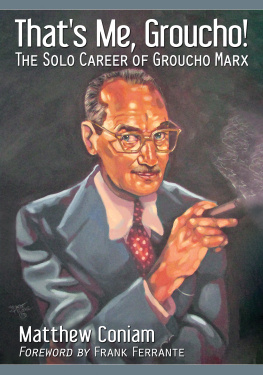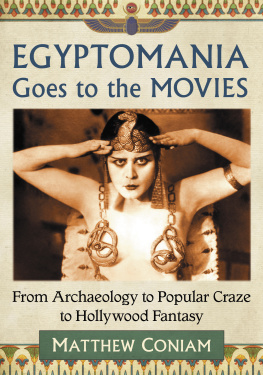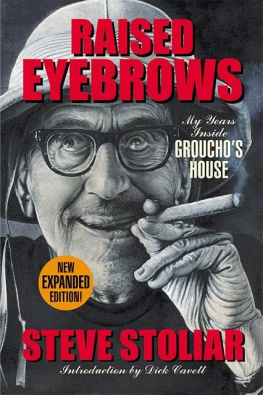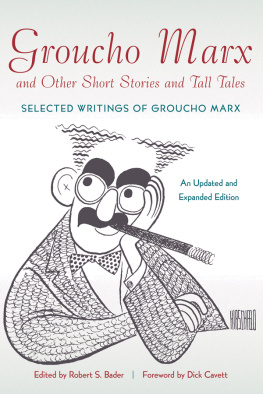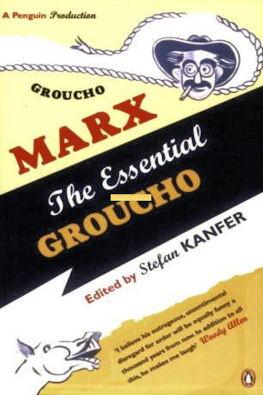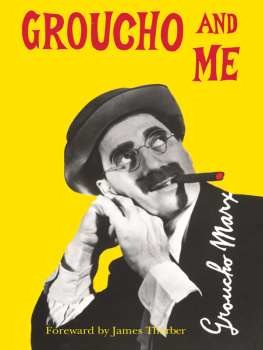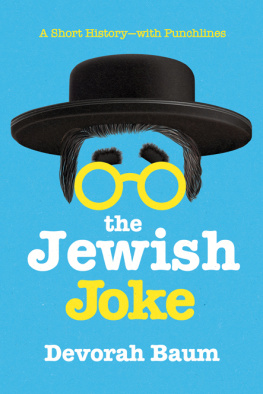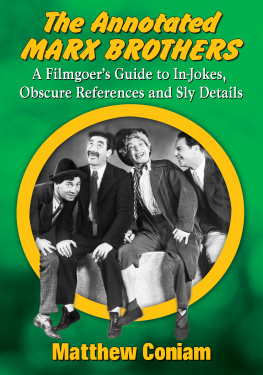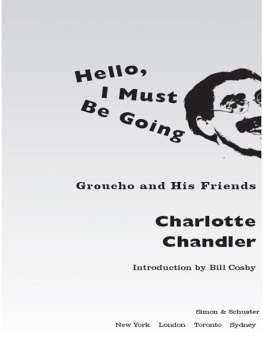
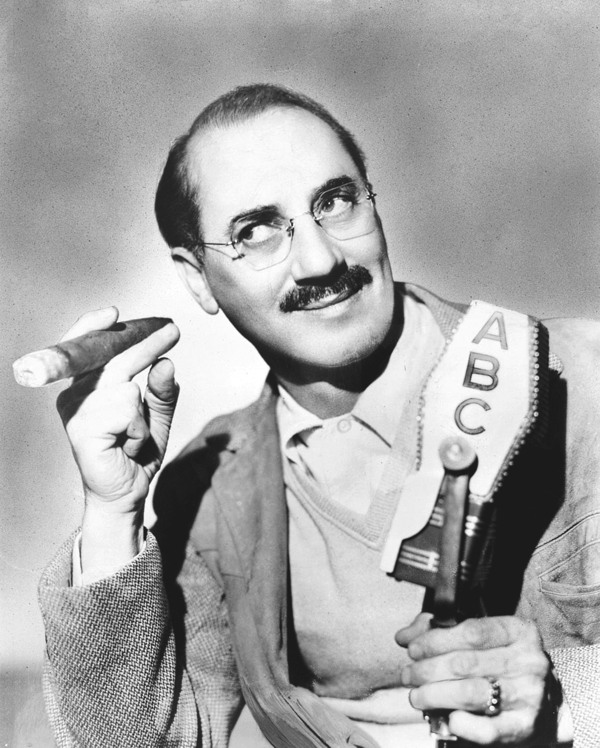
Thats Me, Groucho!
The Solo Career of Groucho Marx
MATTHEW CONIAM
Foreword by Frank Ferrante

McFarland & Company, Inc., Publishers
Jefferson, North Carolina
Also by MATTHEW CONIAM
The Annotated Marx Brothers: A Filmgoers Guide to In-Jokes, Obscure References and Sly Details (McFarland, 2015)
LIBRARY OF CONGRESS CATALOGUING DATA ARE AVAILABLE
BRITISH LIBRARY CATALOGUING DATA ARE AVAILABLE
e-ISBN: 978-1-4766-2597-3
2016 Matthew Coniam. All rights reserved
No part of this book may be reproduced or transmitted in any form or by any means, electronic or mechanical, including photocopying or recording, or by any information storage and retrieval system, without permission in writing from the publisher.
Front cover artwork 2016 Stuart Troxel
McFarland & Company, Inc., Publishers
Box 611, Jefferson, North Carolina 28640
www.mcfarlandpub.com
For George Bettinger, who gave me the napkins.
And for Don Whearty, who drew them.
And for Frank.
And for Miriam.
Foreword
by Frank Ferrante
And here he is the one, the only Groucho!
An unholy trinity, those Brothers Marx. They remain an eternally sublime trio, forever linked as arguably the funniest, most original comedy team of the past century.
However, middle brother Julius Henry Marx, a.k.a. Groucho, debuted as a single act, persevered on stage for a remarkable 71 years and bookended his career solo. At 15, Julius toured the vaudeville circuit as a boy soprano and on his first contract was abandoned and left penniless by an unscrupulous actor/manager. At 85, Groucho trouped and wheezed renditions of Show Me a Rose for throngs of young fans like yours truly. And even then there was the sense that Groucho was alone. Show me a rose or leave me alone.
Those of us who venerate Groucho Marx relate to the loner. He is often the lone wolf within the context of the three Brothers stage and film shenanigans. Chico and Harpo individually and in tandem often conned and plotted against himan outsider within his own tribe. (Recall Dr. Hackenbushs tootsie frootsie-ing in A Day at the Races and S. Quentin Quales pickpocketing in Go West.) Asked by Dick Cavett to which brother he was closest, Grouchos response was Gummo, with whom he shared hotel rooms while zigzagging throughout the country in vaudeville. Perhaps, in terms of the fraternal dynamic, art imitated life. And yet the Brothers bond is undeniable. Grouchos son Arthur Marx who co-wrote Groucho: A Life in Revue, in which I portrayed our hero, mentioned to me that Groucho spoke to his brothers daily, even if the conversations consisted of How are you, Chic. Im fine, Grouch.
Ive had the furtive delight of listening to Richard J. Anobiles 1973 Groucho interviews, which comprise the core of The Marx Brothers Scrapbook. The seeming harshness of his responses on the printed page belies the surprisingly tender timbre of Grouchos staccato delivery. Sprinkled throughout those exchanges with Anobile: I loved my brothers. I loved Chico.
He became famous as one of four performing brothers, but according to son Arthur and daughter Miriam, Groucho never felt like a star. After over 25 years as a Marx Brother, he was primed to strike out on his own. When the Marxes disbanded in 1941, Groucho lamented his subsequent radio failures and insecurities to Miriam in letters she generously shared in her published collection Love, Groucho.
In his fifties, Groucho struggled with a sense of failure. Arthur confided to me that his father, often morose and solitary, planned for his demise from age fifty. The elder Marx, who never made it past the sixth grade, took solace in his solitude and intellectual pursuits. He spent incalculable hours reading while smoking his pipe and the occasional Dunhill cigar. Henry James, Somerset Maugham and Ring Lardner lined his shelves, as did The Best Plays volumes 1921 through 1944. Groucho subscribed to multiple periodicals and kept a dictionary in his car glove compartment. He composed thousands of letters, of which there are two published volumesThe Groucho Letters and Miriams memoir. A dedicated guitarist, Groucho strummed along to Gilbert and Sullivan operettas, reveled in classical music and that of his contemporariesBerlin, Gershwin and Porter.
All of this fed Grouchos comic mind, spirit and art, and he was well oiled when You Bet Your Life appeared on the horizon. The quiz show, sans his brothers, generated hundreds of hours of entertainment. Contemporary and fluid, Grouchos wit was transcendent, gleeful and refreshingly honest. Tempered contempt, juxtaposed with a certain warmth, exuded from the kindly old quizmaster. Groucho the soloist was born, and King Leer reigned supreme.
Groucho never devised a solo act for Las Vegas, the performing arts center circuit or concert halls, like peers Jack Benny, George Burns and Red Skelton. The consummate wordsmith did not consider his comic style suited for Vegas or Friars Club roasts, and on Cavetts program he lambasted dirty entertainment. Words were not necessary when eyebrows conveyed volumes. In the twelfth hour of his career, despite obvious fragility, he forged on with his An Evening with Groucho live performancein true vaudevillian fashion, premiering it out of town, in Ames, Iowa. A subsequent album from his Carnegie Hall show was released and, like many of my peers, I wore out the grooves of that sacred disc. From his First, Id like to take a bow for Harpo and Chico to the rapturous applause capping Lydia, the Tattooed Lady, Groucho elicits goose bumps. The great mans highly anticipated performance is moving, funny, exhilarating and sadand I was left imagining the possibilities if Groucho had taken his act on the road decades prior.
What if Groucho Marx had performed a one-man show in 1934 between filming Duck Soup and A Night at the Opera, instead of the summer stock production of Twentieth Century in Skowhegan, Maine? For the past 30 years, I have performed my show, An Evening With Groucho, with that premise in mind. With the benefit of hindsight and Grouchos inspiring legacy, I mix his interrogative conversational banter from You Bet Your Life with the attack of his brasher, younger stage and film persona, breaking the fourth wall so todays audience can experience a taste of Groucho up close. It is my fantasy, my homage, and one that I hope Mr. Marx would appreciate.
Matthew Coniams homage here is a welcome and long overdue addition to the Marx literary canon. Mr. Coniam is a Marxist of the highest caliber. The sheer amount of performance, entertainment, laughter and joy conjured by Groucho Marx over his lifetime and beyond is immeasurable. But Mr. Coniam, a dedicated devotee and chronicler, reveals the expanse of the great mans solo contributions and lasting influence. Groucho Marx would love this book.
In Grouchos final years, he transitioned from quizzer to quizee on the talk show circuit. These interviews read as solo performances, displaying the breadth of Grouchos intellect and humorgold nuggets from his enduring comic mind. Live appearances were few, but I was privileged at 13 to attend one of his last. Just short of 86, Groucho appeared at the Ambassador Hotel in Los Angeles. With trademark beret and thick glasses, he shuffled to the podium. I followed my hero like a duckling and sat patiently at his feet. Groucho mumbled inaudibly to a concerned, packed room. The tension felt by hundreds of expectant admirers was palpable. Finally someone asked, Groucho, are you making any new Marx Brothers movies?
Next page
